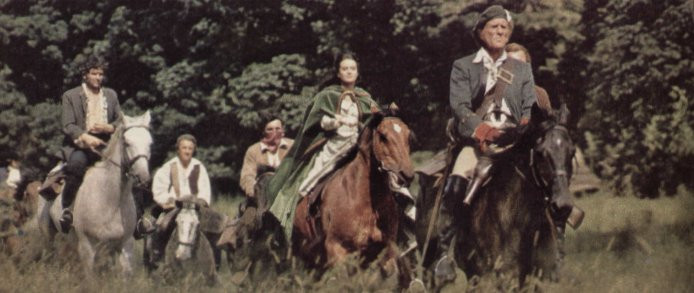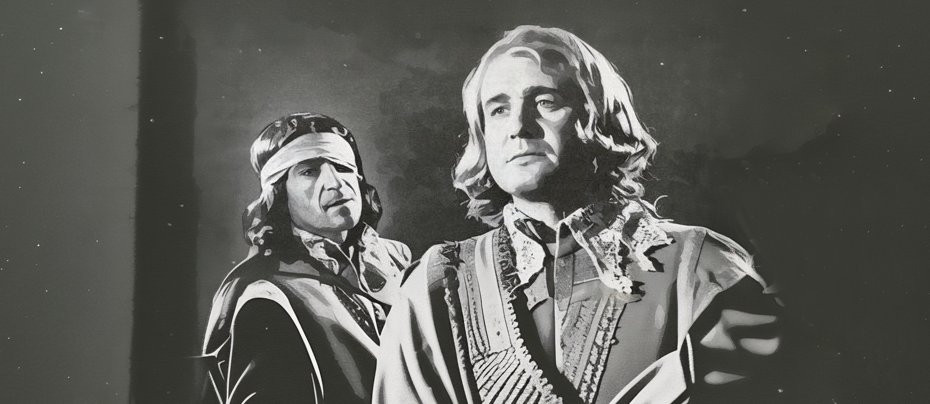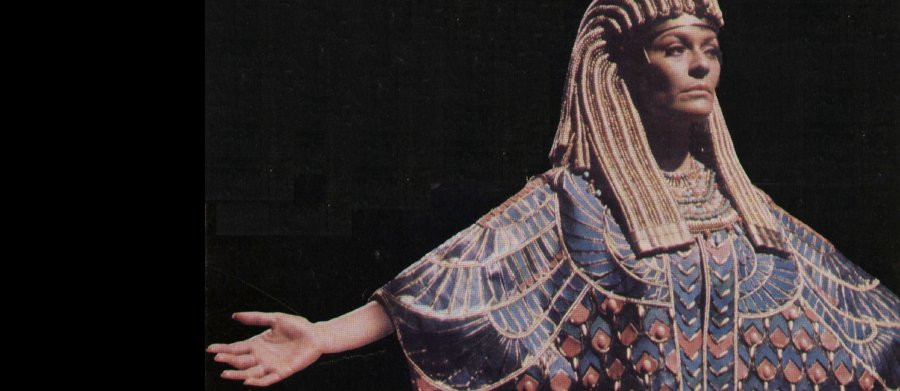
Antony and Cleopatra
1974 - United KingdomThe RSC production of Shakespeare's famous story of power and passion in Ancient Egypt was presented on ITV on Sunday 28 July 1974 in an epic three-hour production. Richard Johnson and Janet Suzman played the eponymous heroes and a cast of over fifty supporting players included Patrick Stewart, Ben Kingsley, Tim Pigott-Smith, Corin Redgrave, Tony Osoba and Leonard Pearce.
The plot follows the relationship between Cleopatra and Mark Antony from the time of the Sicilian revolt to Cleopatra's suicide during the Final War of the Roman Republic. The major antagonist is Octavius Caesar, one of Antony's fellow triumvirs of the Second Triumvirate and the first emperor of the Roman Empire. The tragedy is mainly set in the Roman Republic and Ptolemaic Egypt and is characterized by swift shifts in geographical location. Many consider Shakespeare's Cleopatra as one of the most complex and fully developed female characters in the playwright's body of work.
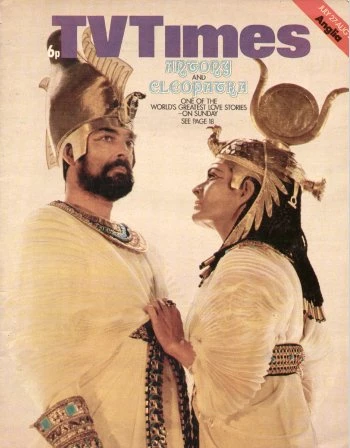
Therefore, an accomplished actress was required to play a sensual alluring Cleopatra, a woman who used her sexuality to manipulate Julius Caesar, then Pompey the Great, and now Mark Antony. Janet Suzman was very well qualified in this respect and had the added advantage of having honed her characterisation on stage. Born in South Africa, she ran barefoot around her father's farm, chatted to locals in Zulu and is, according to one friend, "a very determined lady who gets what she wants." After training for the stage at the London Academy of Music and Dramatic Art, Suzman made her debut as Liz in Billy Liar at the Tower Theatre, Ipswich, in 1962. She became a member of the Royal Shakespeare Company in 1963 and started her career there as Joan of Arc in The Wars of The Roses. In 1969 she married Trevor Nunn, Artistic Director of the RSC who co-directed her in Anthony and Cleopatra. In this television presentation she was directed by Jon Schofield. The previous year Suzman's stage performance in the same role played according to critics as a "swarthy, torrid gipsy" had won unanimous critical acclaim.
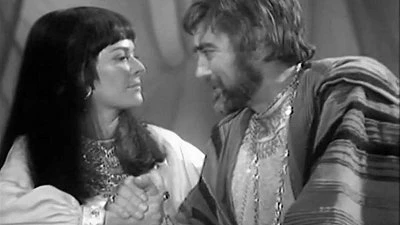
"Have you ever heard that Cleopatra used to wet her clothes so that they clung to her?” she told the TV Times in 1974. “Not that she was a great beauty, as far as we know, but she was obviously full of feminine ingenuity. She was a shameless tease, always searching for a victim's weak spot and exploiting it - the sort of behaviour we consider quite beyond the pale in these days of Women's Lib.”
Suzman is certainly sensual and alluring with her constantly shifting moods keeping Antony off-balance and intrigued, and is particular stunning in the last 20 minutes of this production when she performs an outstanding scene when she makes her "I am fire and air" speech. Most memorable is the visual presentation as the camera pans out to reveal her in full regal Egyptian attire with arms outstretched in a black void.
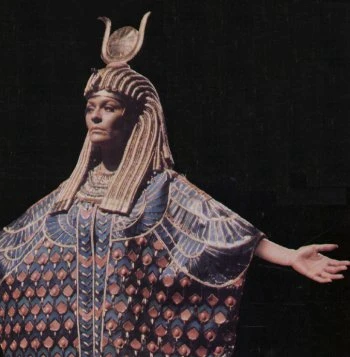
As Antony, Richard Johnson gives a masterclass demonstration of how to portray the decline & disintegration of a once-great man. Born in Upminster, Essex, Johnson was at the Shakespeare Memorial Theatre from 1952 to 1957. In 1958 he appeared in Peter Hall's first production at the theatre, Cymbeline, alongside Peggy Ashcroft. Reviews praised Johnson as "The finest romantic actor of his generation". He was director Terence Young's preferred choice for the role of James Bond in the first film in the series, but Johnson turned the role down as he was under contract at the time to MGM.
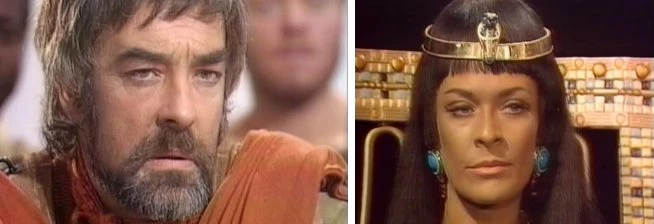
The lion's share of the plaudits went to the then little-known Patrick Stewart as Enobarbus who superbly guides us through the story, pointing out the nobility of the two, and expressing our own doubts about their conduct, before eventually abandoning Antony. His gradual decline into madness and hopelessness perfectly mirrors the play's own narrative and emotional arc.
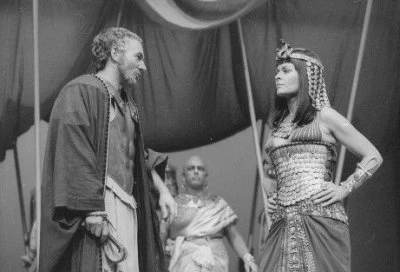
Corin Redgrave is Octavius, the perceptive, goal-driven Roman who prevails through superior organization, discipline, deceit and treachery. Whereas Antony may be a dissolved worn-out warrior, he is honourable. Octavius is an unfeeling powerbroker who lets nothing get in his way; admired and feared but never trusted or loved. Here is everything in one play - love, lust, loyalty, duplicity, politics, war, pleasure, dignity, and shame.
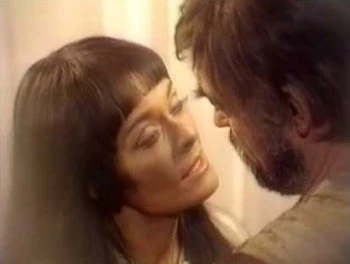
Jon Schofield abandons the idea of having luxurious and colourful sets and there is little in the way of scenery. The worlds of Rome and Egypt are invoked through lighting and sound: blinding white for Rome, sultry yellow for Egypt, black for the inside of Cleopatra's monument, and the camera is soft focussed to deliberately give impressions of distant action, creating the effect of a mirage. Staged almost entirely in medium to tight close-up there is extraordinarily little to distract from the performances. One critic remarked: “By downplaying spectacle, and using simplified sets, Schofield allows the actors to shine and the language to glow.”
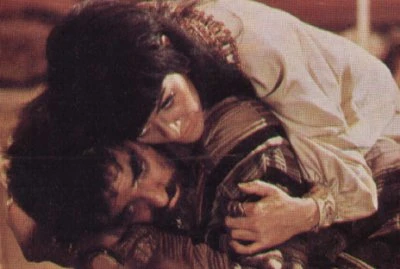
Antony and Cleopatra is considered one of Shakespeare’s richest and most moving works. The principal source of the play was Sir Thomas North’s Parallel Lives (1579), an English version of Plutarch’s Bioi parallēloi. Plutarch is thought to have written this in the second century AD. Antony and Cleopatra died around 30BC and are arguably the most famous lovers in history. Their love affair, their war together, their defeat and, finally, their suicides have been told and retold for centuries. Janet Suzman summed up the appeal of the play: "Anthony and Cleopatra had the magic combination of heart and intellect. Both were powerful, and power is attractive and also very sexy." In reality, neither Antony nor Cleopatra changed the world in any great way. Unlike Shakespeare, who most profoundly did.
Seen this show? How do you rate it?
Seen this show? How do you rate it?
Published on July 31st, 2020. Written by Marc Saul for Television Heaven.






